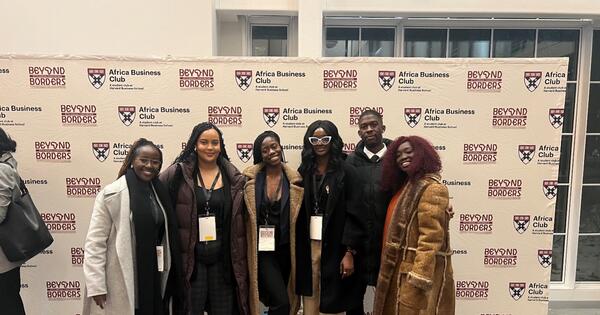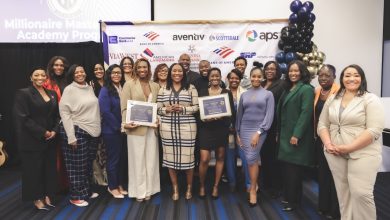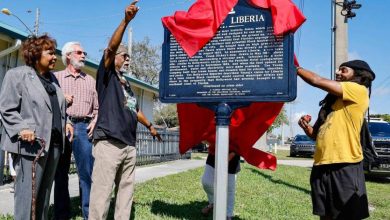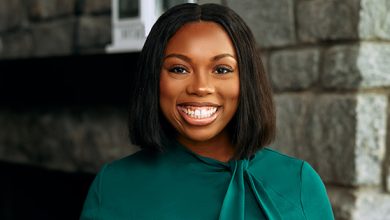Transcending Borders at the Africa Business Conference

In February, I was proud to attend Harvard Business School’s Africa Business Conference as co-president of the Yale SOM Black Business Alliance. I went alongside my classmates Oluwafemi Ayangbayi and Dean Okoduwa, co-chairs of Yale SOM’s Africa Business and Society Club. The presence of student leaders who, like me, straddle multiple worlds while remaining deeply tied to Africa emphasized the power of engaging across the Pan-African diaspora. At the conference, we felt like more than just attendees; we were part of the narrative, and we carry a responsibility to use the insights we gain inside the classroom to build unity back home.
This year’s theme, “Beyond Borders,” invited us to reimagine the future of Africa through a lens that was unapologetically ambitious. Could breaking down barriers between nations really accelerate economic growth, spark innovation, and promote sustainable development across the continent? The answer, echoed in every panel, keynote, and coffee chat, was a resounding yes, but with a caveat: it will require intentional leadership, collaborative vision, and a relentless commitment to doing the hard work.
Growing up in America in a Nigerian household, I often found myself walking a tightrope between two identities, and feeling disconnected when I was told I wasn’t “African enough.” That tension, quietly carried and too often left unspoken, made my experience at the Africa Business Conference deeply personal and profoundly validating.
The day began with a powerful keynote titled “The AfCFTA Opportunity: Is Africa Ready to Unleash a New Era of Trade?” featuring Elsie Kanza, Tanzania’s ambassador to the U.S., and Banji Oyelaran-Oyeyinka, senior special advisor of the African Development Bank Group. The African Continental Free Trade Area, which comprises 55 nations and is the largest such zone in the world, holds the promise of reshaping Africa’s economic landscape, but the vision will not realize itself. As the panelists reminded us, we must confront the hard truths: trade harmonization without physical infrastructure is a paper dream. And yet, hope lies in regional collaboration, policy alignment, and empowered local business that can scale beyond borders.
Throughout the conference, breakout sessions offered a kaleidoscope of insight across sectors including music, fashion, governance, technology, and healthcare. This was especially important to me as a dual MPH/MBA candidate. In the panel “Sustainable Healthcare Delivery Models in Africa,” I was particularly struck by the speakers’ focus on non-communicable diseases and how local pharmacies can be reimagined as frontline healthcare providers. The emphasis on investing in local pharmaceutical production and building regional health ecosystems was a reminder that Africa’s health future must be built not just for the people, but by the people.
Another standout panel was “Redefining the Narrative: African Creatives Charting New Paths.” As someone who once felt “not African enough,” witnessing artists, designers, and digital pioneers reclaim their identity on their own terms was a full-circle moment. These creatives are not waiting for validation; they’re building their own tables, audiences, and platforms, and they’re doing it without losing the authenticity that makes African storytelling so powerful.
Our second keynote, “Governance & Economic Transformation,” with former Ghanaian vice president Dr. Mahamudu Bawumia, brought the conversation back to leadership and accountability. His reflections on Ghana’s journey with digitalization and job creation reminded us that governance is not a passive concept, but rather has to be bold and deeply rooted in the realities of the people it serves. One of my favorite sessions, “Cross Over Borders: The Global Rise of African Sports and Gaming,” took a personal turn: As someone who grew up on Madden, FIFA, and after-school football practice, this intersection of my childhood passion and gaming across continents was electric. The panel unpacked the opportunities in infrastructure, talent development, and tech-driven platforms to elevate African athletes and gamers onto the world stage. The takeaway? Africa’s influence in global culture is already here. We just need the systems to match the talent.
The day ended with good food—meat patties, plantain chips—and warm conversation with peers from across the globe. We reflected on what it meant to be African, shared laughs, and swapped personal information to stay connected for the future!
None of this would have been possible without the support of Yale SOM’s Office of Inclusion and Diversity and their External Partnerships & Travel Initiative. I’m deeply grateful for the chance to attend and the space to grow, be challenged, and return with a clearer sense of how I can contribute to the SOM community. At Yale, we talk about leading for business and society. Conferences like these remind me that “society” includes the countries we represent, the cultures we carry, and the futures we imagine.
About OID’s External Partnership and Travel Initiative:
Yale SOM and OID are committed to enhancing equity and inclusion in our student community and with our external partners. As we prepare our students to be leaders in business and society, it is important to build relationships with potential collaborators, stay informed on current trends in our industry, and showcase our expertise to a wider audience. To facilitate this, we launched the External Partnership and Travel initiative, which allows us to sponsor attendance for SOM students at domestic and international affinity-based conferences.




